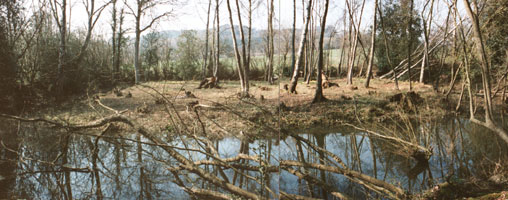
When I got home permanently from the Met Office I enjoyed freedom to study some more the monsoon depression which occurred on 3-8 July 1979 over the Bay of Bengal, through which I had so enjoyed flying in US research aircraft. I worked upstairs on the top floor of our 7 bedroom Old Manor Cottage, while my mother wrote her diary at the Dining Room table. She read widely, and prepared quizzes of literary quotations, both easy, and more difficult. It was sublimely peaceful, and silent in our three acre garden, in which interesting trees and shrubs had been planted by Geoffrey Pilkington, of the family of Pilkington Glass, a great friend of my mother. We loved one another and our great house, and wanted to hang on there for as long as possible.

2300, 13 Aug 92. Thump! No question about it. That was Mum falling. Sure enough, she is lying on the floor in her Bedroom. I lift her into bed. Since her first stroke the previous November, she hasn't been talking much, so it takes us 45 min to decide that we really have to call the doctor. Mark Hurst arrives. We know him well. He is one of Haslemere's "typical citizens". He hasn't brought his hockey stick with him this evening. Look, he says, see how this leg is longer than that one? It means that she has definitely broken her hip. Oh, right. Mum lies there without complaining. She never does complain; her usual serene expression is a bit disturbed. The ambulance comes and takes her away to the Royal Surrey County Hospital, Guildford. They fix the hip in 45 minutes.
I start to decorate a Bedroom on the ground floor for the two of us, next to the Kitchen, so that I can look after her. I am very keen to get her home again, so that she and I can live in the luxurious peace and quiet which we both so much enjoy. When Mum dies I shall have to sell the house, give my sister half the proceeds and pay off Mum's mortgage. After a week in Guildford Mum is brought to our local Haslemere Hospital to convalesce. I visit every afternoon. There is some dismay at the Hospital that Mum shows no signs of getting ready for physiotherapy and walking on her new hip joint. Mostly she just lies with eyes closed and mouth open. "Just look at her" says a lady opposite. We see what she means. I don't try to explain that even before she broke her hip she was not that good at walking; she had been getting around with the help of the furniture, and climbing the stairs to her Bedroom by hauling herself up the bannisters. I'm keen to rekindle her enthusiasm for life by getting her home. After I have lost half a stone the new Bedroom looks really neat, ever so warm and cozy. On 8 September an ambulance brings Mum home.
With an oil-fired boiler permanently providing hot water and general heating, we were comfortably set up. CARE volume 1 starts on Thursday 8 September 1992. "1435. Home to Nursery newly painted Vinyl Matt Emulsion Buttermilk. She requested transfer to her bedroom vertically above. Minny (my sister) approves of it."
I have loudly proclaimed that I can manage all right certainly. The first thing I do is call Haslemere Hospital at 0100 in the morning about the weird appearance of Mum's hip area. One side looks quite different from the other: wow. Has the Hospital made some serious mistake? I get on to Dr Forsyth. She wakes up and sounds sensual and irritated at the same time. Why don't we take a couple of Paracetamol? At 0810 next morning she comes whizzing in, rousing our neighbours and us; of course there's no problem. I say don't report this to the Hospital, OK. She reports it.
Later in the day I have a big interview. Maureen Smith (Occupational Therapy), Gerry McCarthy (Health Visitor, Social Services) and Jenny Draper, the nurse who came earlier for the regular morning visit, sit around our Dining Room Table gently asking me questions. Can I cope? They are ever so sweet and reasonable and caring; they are also very professional. I have found a clean shirt. It turns out that they are not overly concerned to find weaknesses in my character - and I am not thinking about how I may be saving the National Health Service some £150 per day by taking on the job. They permit me to look after my Mum! Later I regret that they don't get me to go for Attendance Allowance and Invalid Care Allowance right from day one. I let this business lapse while I concentrate on getting Mum settled; the Department of Social Security pay claims from the date on which you sign their Application Forms - not necessarily the date when you start work. For help I am to have a visit by a District Nurse every morning, to give Mum a proper professional wash, and check up on our sanity.
Next day at 1030 came Sister Margaret Farrow, big and strong; she always showered us with praise and encouragement. She liked Motor Racing on the TV. My mother and I didn't use radio or TV, except for the BBC News at 10 pm; we both liked silence: "In quietness and in confidence shall be your strength" (Isaiah, 30:15).
Whatever one's situation in life, there are always pluses and minuses, One of my big pluses is contact with the nurses who come every morning. To be a good nurse is to convey love to your patients, to make them feel good. Nurses are professional lovers. It is their job to love all of the creatures who come to their care, whether more attractive or less attractive. To be a nurse means that one must essentially like human creatures, must be interested in people per se. It seems to me that this is a feminine rather than a masculine attribute. Women can be great gossips; men can be great abstract thinkers. Our nurses are unfailingly pleasant all the time. Nothing is too much trouble. If there is a problem it gets solved, even if it means a bit of extra work such as a special visit to bring supplies. Our usual nurse is Nicola Watkins; when she comes I like to just take a rest, write what she does in the log book, listen to what she says and admire her small figure as she goes about her work. We feel sad when she goes off to London at the end of September to get more training.
After Nicola departs it is Sister Margaret Farrow who mostly looks after us. She has lots of chutzpah; she can make you feel cheerful when you definitely aren't; if you feel like a wet sock you'll be wrung out and stood up straight. She alone can get Mum to talk and smile. Maggie doesn't work on Wednesdays, and then Michaela Kelly often comes. She seems quite young and has a serene expression, a bit like Mum at the same age. I think how nice it would be if I could persuade Michaela to come and stay in our house during the week, so that she doesn't have to commute from Guildford every day. One day she tells us that she is married already - too bad! Michaela is extremely tough; as I walk her down the brick path to her car she discusses Mum's death with perfect equanimity; all part of the job.
To help in the house on Mondays, Wednesdays and Fridays comes Mrs Catherine
Strudwick, Katey. I fetch her in the
car at 9 am, and return her to Haslemere at 12. She has always been with us, and knows more about us than we do
ourselves. A small, solid and friendly figure, she is always the same, good humoured and sensible. When spotted
around Haslemere, she's usually having a giggle with another oldie friend or relative of hers. Another solid
and friendly figure, Peter Light, comes to mow the lawns and spin-trim the banks on Friday and Saturday mornings,
He likes to come shortly after sunrise, and works for 4 hours. He too has been with us for a very long time. Because
we don't get up very early in the morning I don't have much control over where he works or what he does, but everybody
seems to like the garden. Now that Mum and I live on the ground floor his early morning hours are even less good for
us than they used to be, but heavy-handed hints like driving straight at him and the wheelbarrow, always in a rush
while on the way to collect Katey, leave him unmoved. One morning his jovial grin is obscured by a mass of worm-casts
fling up by the spin-trim. Much drier in the afternoon, I say - to no avail. There is a special peace and quiet in
the morning, for him at least! Taken on 21 May 89, the photo below shows Mum holding a goat of his, with cousin Mary
Frederick looking on, and Peter standing against the wall of the garage.
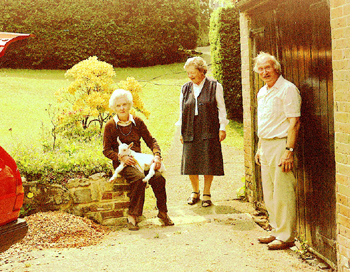
On 6 Oct 92 after the morning session Maggie Farrow departed saying that Mum's colour is not so good and talking of her last days. The general opinion is that she won't last more than a few weeks. This is depressing, and I am induced to write to our solicitor, and to think about divesting the house of some of our less practical and more stealable items.
On Sat 31 Oct 92 Valerie Carr is our nurse. She wears the brown uniform of an auxiliar nurse as opposed to the blue which signifies full qualifications. She has a self-deprecating manner and seems somewhat older than most of the other nurses. She has a tendency to voice complaints and tell tales of woe, and this stands her in ill stead with her colleagues. She has experience of older patients and is very gentle and thorough in her washing of Mum. After a going over by Maggie Mum is usually flat out for a couple of hours; after Valerie she opens her eyes again, ready for a drink, rather more quickly. Valerie gives an impression of being very mild, and then reveals that she is thinking of opening her own nursing home, and is seeking a house about the size of ours. Ours would be no good because it is on a steep hillside, and Valerie wants a flat garden in which her patients could meander without having to climb hills. There is a problem of financing, because the house she needs is larger than her own; however with modest charges of about £250 per week, from several patients, the prospect is good.
During October and November I never know whether Mum will last a couple of days or a week or longer. On 16 November we have a crisis. Mum has always lain on a Spenco mattress provided by the NHS on her left side, the right proving intolerable. On this day a very nasty red crater appears on her lower left back; we call it the volcano. Lying on the right side becomes compulsory. It soon becomes clear that pressure sores are inevitable unless we do something drastic. I look in the Yellow Pages for a water bed, hear the pleasant voice of Joy Boyton-Salts speaking from Portsmouth 45 miles away, and arrange for her son John to bring a waterbed 5 days later. That evening it seems that Mum may only be hanging on to see Polly and Barry just 3 days hence; she may have died by the time the waterbed arrives.
At 1410 on 28 Nov John Boyton-Salts arrives. We get on very well, chatting away about the bed and his 4 children rather to the exclusion of Mum. Soon the bed is in place and filled with water of roughly the correct temperature, and he leaves me at 1650. From 1815-2000 I have a rest on the bed - love at first touch. It is too hot for me, but I think that it will be all right for Mum. At 2100 I move her on to it. The thermostat, called Genesis, is set for 86°F. When you have your waterbed set at the right temperature for you it is heaven, otherwise unbearable. I have to get it right for Mum without her being able to talk to me. After an hour Mum seems uneasy. She wants to see whether she can still move. No; this is frustrating. After 1½ hours she is still not comfortable. "Is it too hot?" No squeeze. "Is it too cold?" Squeeze. I set Genesis to 87°F. For me 86°F is too hot so I don't have confidence. Half an hour later the light on Genesis glows its message that the 360 Watt heater is still working to raise the temperature from 86 to 87°F. Too warm is better for Mum than too cold, so we continue the trial.
A day later at midnight I want to talk to somebody about body heat balances. I find Florence Birmingham (with 27 years experience) on duty at the Surrey Home for the Elderly in Lion Green, Haslemere. Although she has 50 patients to look after, she has time for a 20 minute chat with me. She talks about the equipment she uses - ripple beds. She tells me that if Mum has a weak heart she would need to be warm, and would look flushed if she were too hot. She is a very reassuring presence in the middle of the night.
By 1240 Genesis has at last settled around 84°F from 87°F, and with the blanket at setting 6 Mum seems to be comfortable. I point to the mattress. "Is this too cold?" No. "Is this too hot?" No. "Is this comfy?" No. I say that it will be. Astonishing: the problem appears to be frustration. Her body temperature appears to be OK - the waterbed warming her from below and the electric blanket keeping warm her upper surfaces. After 18 hours it seems that arrangements are satisfactory.
The next day, Monday 30 Nov 92, Maggie comes at 1020. Everyone has dumped on her, it seems, because she is really fed up. She removes the NHS Spenco mattress, saying that if Mum isn't using it there are plenty of people who could. This means that we have no Spenco to fall back on if there is a power cut and the waterbed begins a deathly chill! If we ever get a power cut, the bed will have to covered with towels and blankets to slow down the loss of heat, and it seems that one would have about 12 hours to invent a solution to the problem.
The waterbed now begins to reveal its advantages. (1) Pressure sores don't occur. (2) A water heater means that the body does not use energy to warm up the bed. These two advantages lead to better blood circulation and better general health. On a waterbed it seems that one only needs about 60% of one's usual number of hours of sleep. (3) The mattress cover, the pads laid beneath the sheet to absorb urine, and the sheet on top tend to dry out if wetted, so the bed is easily kept clean, and a bed-wetting does not require an instant overhaul.
Mum does not show any joy on the waterbed; this is not surprising, because it does not give a feeling of mastery over one's fate. OK if one wants to just lie back and take life as it comes, but not if one wants to be mistress of one's fate. We have to work very hard to deal with the pressure sores which have gradually built up before the new bed, and frequent changes of position are required. At 1200 on 1 December I set Genesis from 84°F to 85°F with the electric blanket at 6, a final adjustment. It seems that Mum may be about to float away, that this is the beginning of the end. However next day Jenny Draper comes, and asks "Do you like the bed? Squeeze my hand for a yes" - and the reply is a weak squeeze! So we have a win: the waterbed is established.
When she has the energy, about 10% of the time, Mum is very receptive and cogent. This means that visitors can sometimes be a problem. We have 'good' and 'bad' visitors. Bad ones say things like "Oh, so sad" or "I can't bear to see her like this" or "poor old thing" even after I tell them to watch it; these are generally people who have known Mum a long time. A different kind of brainy bad visitor lights into something fascinating like old farms or thunderstorms and stimulates a barrage of conversation which streams across the patient - not so great if she's always enjoyed commanding attention. 'Good' visitors take care to include Mum in the conversation, hold her hand or smile at her as they talk. Often they are people with experience of nursing.
On 5 March 93 I picked up a Wheelchair from Mrs Edith Kinghorn of St John Ambulance in Wey Hill, Haslemere. We went out in it for the first time on 7 March. This enlarged the scope of Mum's enjoyment of her surroundings, although her eyes remained closed except now and again. We went to the Dining Room and enjoyed the warm fire in the open grate. When the weather got warmer we went off round the garden photographing spring flowers
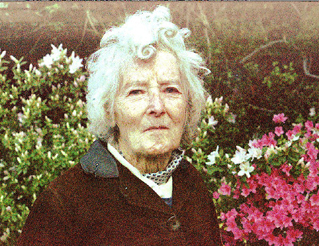
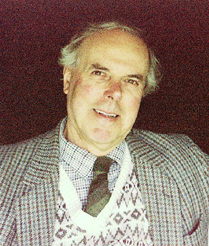
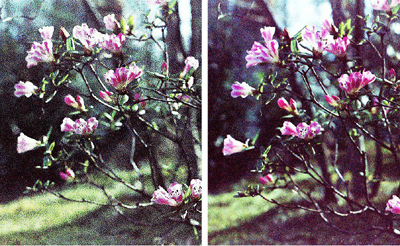
Mum is seen on the left above on 10 May 92, 4 months before her stroke; next to her is Harry Polley, family friend, kind and generous. He shares an interest in poetry with Olivia, and is a Thomas Hardy fan. Below is a stereo pair of azaleas photographed on 17 Mar 93 when we went out in the wheelchair.
Upon the television screen appear pictures of a man operating a field gun, aiming at a Balkan village in the background, a few minutes walk away. Fantastic. Is he solving the world's problems or his own problems? What does he think he's doing? The answer to that is that he is not thinking: he's concentrating very hard on trying to hit the tallest remaining building, or whatever. This is a sort of game, an exciting competition against the 'enemy'. (A little while ago the enemy were just his neighbours.) He is totally absorbed in his activity, unaware of the world at large around him. Let us leave this man, and spy on another creature.
We have fixed our 'bird' table smack up against the window of our room, the better to view wildlife from in bed. Our mouse is on the table, quivering as it enjoys the nuts. It is shortly after dawn on a Friday morning, and so Mr Light is working away in the garden, enjoying the peace and quiet and disturbing it at the same time. He has occasion to trundle a machine past the window; there is a corner of the building preventing him having a direct look at the 'bird' table unless he goes out of his way, and he doesn't want to bother anybody anyway. The mouse seems to realize that probably nobody will come near, so there is no immediate need to hop off like a tiddley-wink and scarper down an azalea branch into hiding. But it takes a precaution. It flattens itself on the floor of the bird table, legs spread out, and gazes intently outwards in the direction of the passing noise for several seconds until it has gone by. Then it resumes its breakfast. Mice never do more than absolutely necessary to avoid capture. There is never a panic or anthing but dignity. Our mice are charming and delightful animals.
Is there any real difference between the man and the mouse? No. Man is said to be an 'intelligent' species, capable of reasoning, able to think about the future, to create works of art, to cry and to smile. It seems to me clear that the difference between man and mouse is just one of size. Man has a large brain, which allows for development of many complicated interconnections, so that he can put two and two together, twenty two and twenty two, and lots more - whereas the mouse's brain does not quite allow for all of that. A man sees other men and realizes that other men can see him, so he becomes conscious of himself. He can even become conscious that he's conscious, and smile when conscious that someone else is not in some way conscious. It would be difficult to argue that a crouching mouse is not self-conscious. On the other hand is a man operating a field gun sensibly self-conscious? Does he know what he's doing? No. Animals don't have any traditions of primary school or higher education; who knows what they might get up to, given a decent chance?
On 4 May 94 I began reading the mail while feeding Mum her breakfast because the meal was taking such a long time. We were managing about 950 ml of fluid intake per day. There was an abrupt reduction on 5-6 May, whereafter I aimed for about 650 ml, feeding as often as possible. Each time I mopped away phlegm from her throat using a squadron of pink sponges on little cocktail sticks, or by sucking it out through a rubber tube. Polly came from 9-12 May. She expressed disapproval of my determined efforts to feed Mum, saying that she should be allowed to die. She persuaded Maggie of this before vanishing again to Leicester. They both deplored Mum's negligible quality of life. This made me very tired. It was the last time Maggie saw Mum, and there was no contact between them. Life had become a struggle.
On 15 May 94 I noted "Mum pretty well" in the log book. We had 20 minutes in the Wheelchair for changes of bedding and nightdress, and a quick look at views from outside the front door and out of the Kitchen window. It seems to be worth offering these joys, but probably they did not register. Final decline had set in by 18 May. Mum groaned, and there was nothing I could do to ease the discomfort. Late on 21 May I finally phoned the emergency doctor for advice: he told me to probe the teeth to see if Mum winced, and probe the tummy likewise, and to administer Paracetamol for pain relief prior to a visit in the morning. Dr Barber quickly diagnosed a chest infection plus thrush - oral candidiasis - on Mum's teeth and prescribed the antibiotic Augmentin for the chest infection and Nystan for the teeth. Our nurse Jean volunteered to go and get the precriptions straight away. An hour later she was back and I commenced treatment. Mum groaned. I went to bed for two hours, then got up to administer a phlegmop followed by a drink of Ribena plus Lucozade. We got half way through the drink and then Mum gasped and stopped. "Have you died?" Dr Barber returned and said that she had passed away.
For 1994 the Finish of the London Marathon was moved from Westminster Bridge to the Mall. I feel that this has made it harder. Towards the end of such a run one wants to know precisely how much further there is still to go, and the old finish over Westminster Bridge was good for this. Dr Barber was telling me "You've crossed the finishing line!"; I thought that I had some way still to go. I cried at losing my little love, but quickly felt a profound satisfaction that there had been no further pain, and that she had gone as soon as the situation became impossible.
After Mum died it was a case of rapid adjustment to changed circumstances - virtues cultivated in yacht racing when suddenly the wind changes. Disposal of Mum's body came first. We had intended to leave her body to medical science, but rigor mortis occurred before her legs could be straightened, and this made the offering unacceptable. I arranged cremation. I failed to advertise Mum's death in the Daily Telegraph, instead putting on a Garden Party to celebrate her life. Lack of any religious emphasis lost me much respect among our nurses. Polly called in our old friend the Reverend Geoffrey Curtis, and he led a short Christian service while Polly and I scattered Mum's ashes at the bottom of the garden, as shown below. On 11 June 94, many people enjoyed this peaceful and happy occasion. Mrs Katey Strudwick is in the middle of the group seen on the right, next to Peter Light's wife Joy.
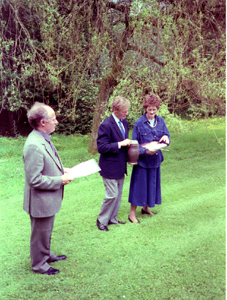
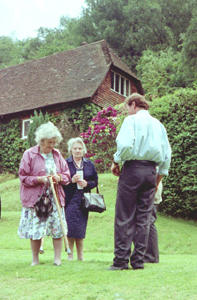
I had to sell Old Manor Cottage to pay off Mum's mortgauge and Inheritance Tax, and move out. Probate was no problem. A bank loan of £14,000 to deal with the mortgauge plus immediately imposed interest payments on it became an urgent problem.
To sell the house I called in a surveyor - the elegant Mr Lucocq of Haslemere. I was very sceptical that such a smooth man could conceivably offer any sensible assessment. He pointed out a large crack in a wall of the northeast wing of the house. The house was sliding downhill on the clay soil very gradually. At first I did not believe this; the crack had always seemed innocuous. To obtain insurance in the future the matter had to be put beyond question, so a great underpinning operation was performed by Chris Foster of Haslemere (with his son Carl and Ken Larby) for £3539. Seen at right in the photo below taken on 5 Jan 95, Chris had been at the house in 1956 when he was 14. Between 19 Dec 94 and 23 Jan 95 they emplaced 8 cubes of concrete 1.5 m on a side below the foundation of the northeast wing of the house. Philip Wells of Haslemere was the overseeing surveyor, and the site was visited on behalf of Waverley Borough Council by Mr Hoffman. I dug out a new soakaway for drains. Those emplaced in ~ 1925 were inadequate.
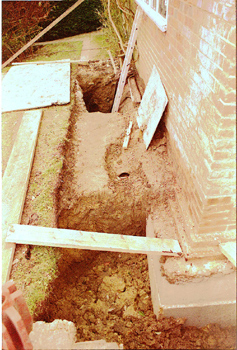
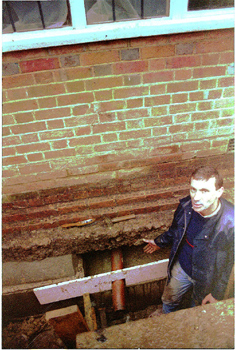
I had to satisfy Mike Stannard of Sun Alliance that Old Manor Cottage could still be insured, and he gave me some anxious moments. We had one family buyer whose sons would have enjoyed the garden, but he wanted to knock down the price of purchase. I insisted on a price both fair to him and fair to Polly and me. In April 1995 the house was bought for £320,000 by Christina Barton - wealthy and glamourous enthusiast wife of Mark Barton, who commuted to the City of London every day by motorcycle. For £71,000 I found a flat at Thirlestane Court in Hindhead, at extreme jogging range from my mother's house, but close enough to stay in touch very occasionally with the Grayswood beech forest of my birth. During this period I published two of my best papers, on "Rings of a beech tree and a Norway spruce compared with climate" (Weather, March 1995), and "A Short History of Witley" in the Witley and Milford Surrey Official Guide (1993), which rapidly went out of print and disappeared.